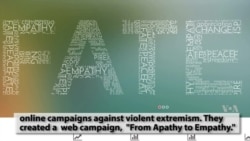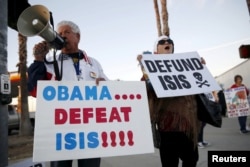Abeera Akhtar and her team of fellow students at Lahore University launched a project last year comprised of multiple social media components and aimed at spurring apathetic young people to resist radicalization.
"Our campaign is called FATE — From Apathy to Empathy," said Akhtar, who is visiting the U.S. State Department in Washington, D.C., this week.
The Pakistani students' Web campaign was selected as the winner of a U.S.-initiated competition on how to best reach younger people who might be targets of terrorist organizations.
"And what we want to do is reach out to the apathetic audience from Pakistan,” said Akhtar of the group's Facebook page and website. “And we reach out to them in different platforms — such as music, solidarity, humanizing — things they can relate to."
She told VOA on Tuesday that visually appealing tools are used to engage and resonate with youthful crowds.
‘Peer to peer’
Forty-five university teams from 17 countries participated this year in the competition, called "Peer to Peer (P2P)."
Each team received $2,000 to produce a real campaign that has a measurable impact on their campus and in their community.
The competition is sponsored by the State Department and the Department of Homeland Security, as well as Facebook, and EdVenture Partners, an outside organization hired by industry and government to engage young people.
The Obama administration is putting new emphasis on its efforts against groups like the Islamic State, which has been adept at attracting followers through the use of social media.
"P2P is a semester-long program where teams of university students work on counter-extremism messaging, and they work on this messaging because they know best how to persuade their peers to not join the extremist ideologies," said Evan Ryan, Assistant Secretary of State for Education and Cultural Affairs.
Ryan says the State Department has been looking for effective tools to fight terrorism and preempt it.
FATE team member Mashal Imran said she came from Pakistan, where some academic institutions must be protected daily by security guards.
A deadly attack last month at Pakistan's Bacha Khan University left 21 people dead when heavily armed militants stormed the campus and waged a four-hour gun battle with security forces.
‘Let’s Talk Jihad’
"Let's Talk Jihad," a project developed by cadets from the U.S. Military Academy at West Point, won second place in the competition.
They developed a campaign that is aimed at youths who are at risk of radicalization.
"We know for a fact when people who are maybe radicalized and looking for information online, they are not going to turn to the government,” said West Point cadet C.J. Drew. “They are not going to turn to different counter-violent-extremism groups.
“They'll be looking for jihad, they'll be looking for ISIS [an acronym for the Islamic State], and by having us do it, catching them before they go over there, we can make a real difference in the amount of people that are going over to the jihadist groups.”
According to "ISIS in America: From Retweets to Raaqqa," a report by George Washington University's Program on Extremism, nearly five dozen people were arrested by authorities in 2015 in the United States for supporting or plotting with Islamic State terrorists.
That is the largest number of terrorism-related arrests in the U.S. in a single year since September 2001.
Some of the online postings by the "Let's Talk Jihad" campaign attracted thousands of visits, said Drew, "especially around the Paris attack and San Bernardino that attract over 50,000 to 70,000 views."
He was referring to coordinated terrorist attacks in Paris last November, and a December mass shooting in California, where one of the shooters — Tashfeen Malik — pledged allegiance to the Islamic State terrorist group in a Facebook post.
"All it took is a few dollars of advertising with the right interests and the right people tagged," Drew added.
‘Faces4Heritage’
"People who destroy the past do not have a future" is the message that students from Switzerland's University della Svizzera Italiana are trying to convey through their "Faces4Heritage" project.
Aimed at raising awareness about the violent destruction of antiques and world heritage sites, the campaign earned third place in the competition.
This is the second year of the State Department's P2P campaign. While the winning teams are awarded up to $5,000, their efforts to prevent homegrown terrorism are priceless.







